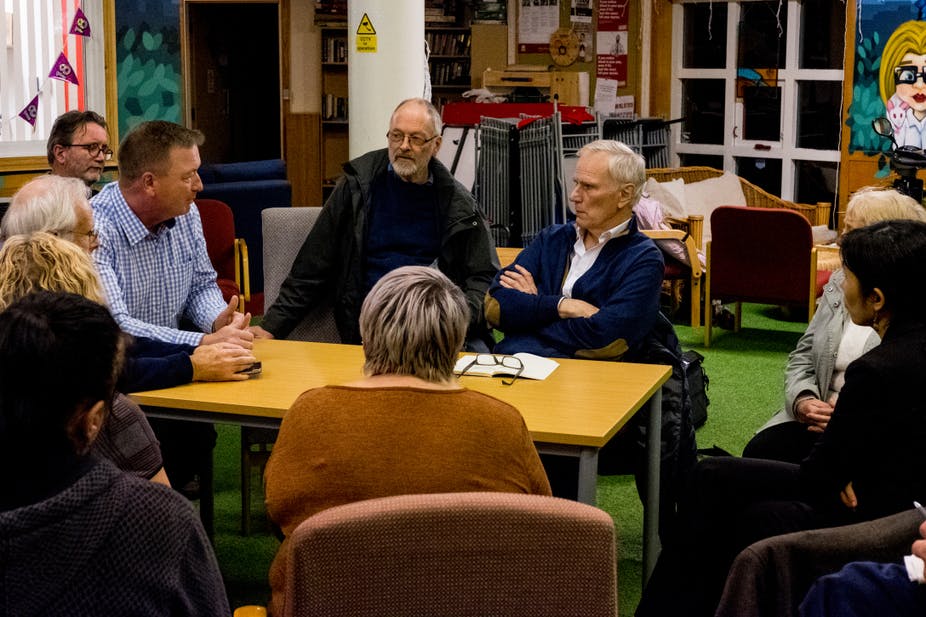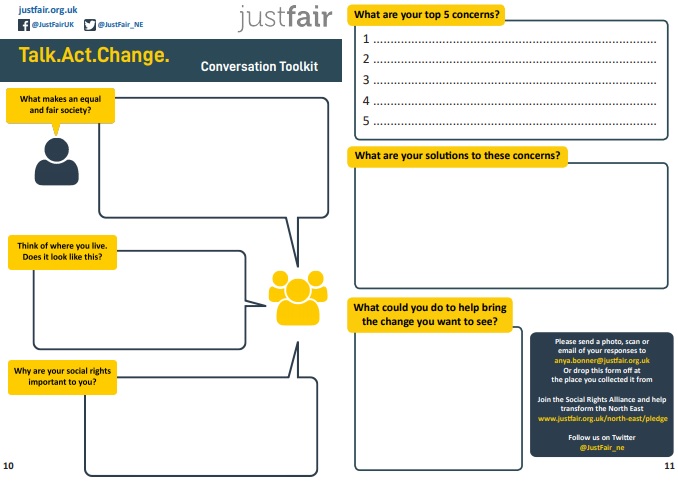A good life for all: why a human rights approach to poverty and inequality makes sense
Posted on 01 Jul 2020 Categories: Blog, Coronavirus, Local initiatives
by Anya Bonner
Across the country, the COVID-19 pandemic is both highlighting and reinforcing existing inequalities, poverty and exclusion faced by many in the UK. Most of these problems existed long before COVID-19 hit our shores and will continue to persist if things do not change. Around the world, communities are recognising that taking a human rights approach presents a powerful opportunity to bring people together, hold policy makers to account, and advocate for change.
The Social Rights Alliance North East (SRANE) is tackling local issues using a rights-based approach, as we believe human rights are more than a shield to protect the individual from the state. SRANE is a collective, regional network for organisations and individuals working to promote and defend economic and social rights and build a North East in which everyone can thrive. Prior to COVID-19 our main focuses were around high public transport costs in the region, and further education opportunities for asylum seekers. Since the pandemic hit, we have needed to alter our focus to include issues intensified by lockdown measures such as digital inclusion and local authority support for vulnerable people.

Economic and social rights are some of the simplest rights to understand, as we interact with them every day. They include the right to housing, food, health, work, social security and education. Described in international law as the essential conditions needed to live a life of equality, dignity and freedom, it is easy to see whether they are being respected or not. Poor-quality rented housing, inadequate benefit payments and the increase in food bank use are all examples of neglected social rights. Economic and social rights are described as progressive rights (in contrast to civil and political rights, which are seen as immediate). This means that a country should be using the maximum of its available resources to continuously advance our rights past the minimum core obligations.
There are seven key principles of a rights-based approach, commonly remembered as the acronym PANTHER. These are Participation, Accountability, Non-discrimination, Transparency, Human dignity, Empowerment and Rule of law. These principles create opportunities to promote structures, policies and cultures that take into account the needs of different people while maintaining a baseline of provision for all people.
Another key feature of a human rights-based approach is universality. This means that rights and freedoms belong to all people, regardless of their gender, age, immigration status, etc. No one should be allowed to slip through the cracks; everyone should be protected. Take, for example, the right to education. Treated as international students, asylum seekers are usually unable to study at university in the UK due to the high tuition fees that accompany learning and transport costs. On top of this, unlike other students, asylum seekers are unable to access student finance loans. A small number of universities across the UK have begun to offer Sanctuary Scholarships, where tuition fees are waived for successful asylum seeker applicants. In some cases, a grant towards learning and/or housing costs is also provided. These scholarships make it possible for more adults to have their right to education realised in the UK. However, while commendable, these charitable acts are not the solution. Instead, appropriate government action should be taken to ensure the country effectively fulfils the right of each asylum seeker to education.
A human rights-based approach looks not only at an individual and whether they are able to access their rights, but also at what governments are doing to ensure people’s rights are respected and fulfilled. For example, rather than just looking at how many people have decent housing you can also look at whether a government is working towards improving housing conditions for everyone, or if they are actively undermining housing rights by passing detrimental laws and policies. Not all action has to be active. For example, a government may have a negative impact on housing standards simply by failing to enforce housing regulations.
In the North East, the digital divide has been exacerbated by COVID-19 as an important issue affecting many different groups of people. Some of those most likely to experience barriers to digital inclusion are people living in poverty, people with disabilities, the elderly, and asylum seekers and refugees. Seen from a rights-based perspective, lack of digital access (for whatever reason) prevents many people from exercising and enjoying many of their rights. Someone unable to access the internet may struggle to access information, social security, education, job opportunities, even food. A collective of organisations in the region, many of whom are members of SRANE, are focusing on the indivisibility and universality of rights to develop Better ConNEcted, a campaign promoting digital inclusion as a necessity rather than a luxury.

For SRANE, one of the most important elements of a rights-based approach is meaningful participation in decision making. In order to create systems, structures and processes that truly work, those they are designed for must be consulted by policy makers. The Talk.Act.Change toolkit has been designed to be used by anyone – friends, colleagues and community groups – to identify social rights issues that might be affecting them and share their ideas of how they could be improved. The toolkit includes information about social rights and equality, a response sheet for answers, and a workshop format for ideas. The responses gathered from this toolkit help SRANE identify areas for change and develop effective campaigns to promote true equality in the North East.
Want to be part of the change and join the conversation? Download our Talk.Act.Change toolkit. Sign our pledge for social rights and get involved with SRANE.
Anya Bonner is Just Fair’s North East regional manager and coordinator of SRANE. Just Fair is a human rights NGO that monitors and campaigns for social rights in the UK. For more information, email anya.bonner@justfair.org.uk or visit http://justfair.org.uk.
Want to keep up-to-date with our coronavirus coverage? Sign up to our newsletter.
Posted on 01 Jul 2020 Categories: Blog, Coronavirus, Local initiatives
